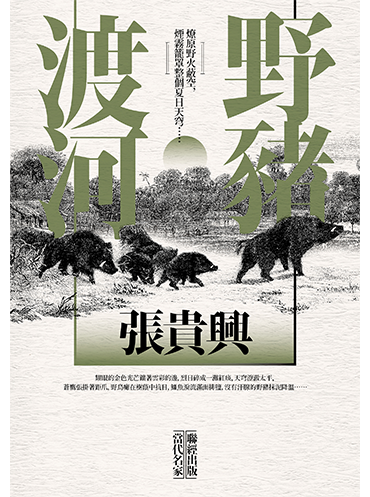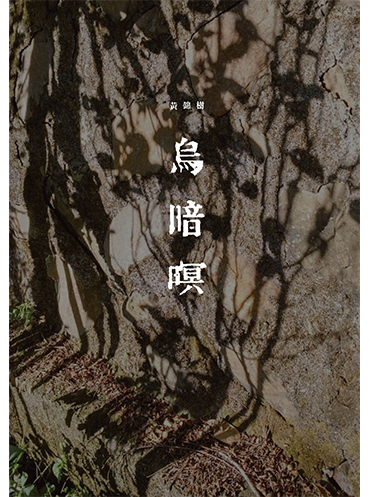‘Out of thin air: a big bang, followed by falling stars. A universal beginning, a miniature echo of the birth of time . . . the jumbo jet Bostan, Flight AI-420, blew apart without any warning, high above the great, rotting, beautiful, snow-white, illuminating city.’ The opening scenario of The Satanic Verses occupied my mind when I was witnessing my fellow passengers floating in the cabin on a free-falling Emirates flight above the Himalayas. Thank God, twelve hours later I, still in one piece without new-grown wings or hoofs, arrived in Gibreel Farishta’s ‘Proper London’, just in time for the English PEN Presents award ceremony to be held later that night, where I would be pitching my translation of Luo Yijun’s Tangut Inn.
Such an unexpected sequence of events all started with a Facebook message that I sent to Mr Luo on an impulse four years before: ‘If no one’s doing it, I would love to translate your marvellous story about the Tangut Kingdom.’ I didn’t expect to receive a reply, but seven hours later my mobile vibrated.
But why would I want to translate Tangut Inn in the first place? A convenient answer is that I needed some distraction from my doctoral project on James Joyce’s Ulysses. However, the more I think about this haunting question, the more I realise it is the uncanny resemblance between these two novels that has propelled me to plunge into such an impossible task. Just like Joyce’s Dublin upon a Homeric plane, Luo’s contemporary Taipei is a labyrinthine city overlapping with the spectral ruins of a medieval nomadic kingdom. Indeed, the Taipei-Dublin analogy is nothing new to the Taiwanese literary scene: Pai Hsien-yung’s Taipei People is an explicit nod to Joyce’s Dubliners, while Wang Wenxing is a self-appointed protégé of Joyce and an uncompromising practitioner of his modernist experimentalism.
Another latent thread beneath both novels is their French connection. On the one hand, Ulysses was published by Shakespeare and Company, a Bohemian Rive-Gauche bookshop, during Joyce’s sojourn in Paris, while its French translation by Auguste Morel also benefits greatly from Joyce’s direct input. On the other hand, Luo’s long-time friendship with Yang Kailin, a Taiwanese Deleuzian, had a profound influence on Tangut Inn, as a miscellany of French philosophical concepts––either Deleuzian, Lacanian, or Bergsonian––shine through whenever I read it.
Such comparisons may seem far-fetched in the eyes of sober-minded readers, but a paranoid PhD student working on Joyce could read ant trajectories into mathematical algorithms. And here is one final footnote to my ill-informed decision: I was never a fan of austere academic prose, and the translation project would grant me a perfect pretext to play with all the grotesquely beautiful phrases I’d stollen from Joyce’s novels. It may sound self-indulgent, but when I started translating Tangut Inn, I did think of Auguste Morel.
Perhaps a Joycean’s brain is too scrambled to tell whether a book is funny or dull, but it still surprises me that so many Taiwanese readers dismiss Tangut Inn as an unreadable novel. One of the default responses I get from friends is ‘How on earth could you manage to translate it into English? I can’t even bear to read it in Chinese!’ True, Tangut Inn has a massive physical presence of two heavy volumes, but for me it has always been a pleasurable read: each chapter––or monadic ‘room’––of Tangut Inn stands on its own as a self-contained story and could be ingested at one sitting, yet these stories are so intricately arranged that they compose a dazzling constellation. For those who loathe philosophical mumbo jumbo and prefer celebrity scandals or penny dreadfuls, Tangut Inn has got even more to offer: it exposes the hidden history of ‘two Chinas’, with an excess of sex and gore à la Quentin Tarantino. In a nutshell, it’s a crazy cocktail that mixes The Bloody Chamber and The Satanic Verses, with bits and pieces of J.R.R. Tolkien’s fantastic dark world.
‘Okey-dokey, you’ve almost convinced me. Tangut Inn sounds fairly inviting, if not lethally hilarious.’ Some readers may grunt, ‘But how did you manage to translate all its puns, jokes, allusions and portmanteaus into English?’ What I’m about to say may appear counter-intuitive, but the answer is that in most cases I didn’t even bother to translate them. I simply looked for them. It’s no secret that Luo is an avid consumer of Anglophone (post-)modernism and popular culture, and, during the translation process, I often ran across fragments channeling Angela Carter, Salman Rushdie, Thomas Pynchon, or even some melodramatic dialogues from CSI. Say, when I bumped into a marionette opening her eyes on full moon nights and stabbing her master puppeteer in the heart, I would flip through the pages of ‘The Loves of Lady Purple’ for easy solutions. Nevertheless, there were still times when I fought to forge something out of nothing. An illuminating example is that I resorted to faux-Elizabethan English when translating entries from Erdeniin Tobchi or other historical documents, and ended up with sentences like ‘Within the ſeige are Qo’ai-maral and Börte-chino, doe-not kille the paire.’
Now, one final question that remained unanswered is: ‘It seems rather idiosyncratic to translate Xixia Luguan into Tangut Inn, doesn’t it?’ Therefore, I would take the liberty of defending my rationale. To begin with, ‘Xixia’ is a nomination that betrays Sinocentric overtones, not only because Tangut people never referred to their kingdom by this name (as Xi denotes ‘on the western periphery’) but also because the Hànyǔ Pīnyīn system fails to represent how Tangut names were pronounced in the Middle Ages. Also, Tangut resonates better––at least to my ears––with Tabgaç (the king) as well as Tunick (the protagonist), thus serving as a vertex of a holy trini-T (or, better yet, of a perfect diamond, if we think of Luo’s Tangut Kingdom as a metonymy for Taiwan). As for ‘inn’, it denotes an old-fashioned pub providing accommodation and sets the perfect scene for all those exiled boozers who never feel at home in Taiwan, whereas it also hints at Holiday Inn, an American brand of hotel chain in an era of neoliberal globalisation. If we sum up all these connotations, the combination of ‘Tangut’ and ‘Inn’ becomes a monad into which heterogeneous planes of spacetime and personages from disparate backgrounds can be folded.
What I do as a translator is unfold the monadic universe, as Jacques Derrida puts it, ‘in a movement of love’ towards a larger audience beyond my dear dirty island.


